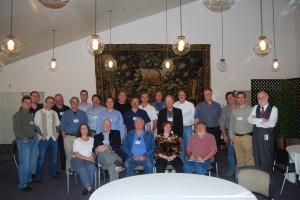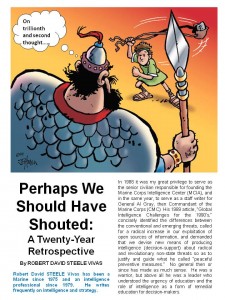
We pay careful attention to the search terms used by those who visit us, and have noticed a very healthy focus on strategy and on secrecy. The two are incompatible.
Strategy, by its inherent nature, must be holistic, transparent, and sustainable. It demands broad collaboration and the broadest possible information-sharing and sense-making.
Secrecy, by its very nature, is reductionist, completely opaque, and generally not sustainable beyond the moment. It restricts collaboration, excludes key stake-holders with relevant information, and does not share effectively.
Michael Herman's book on Intelligence in Peace and War is the best available review of why intelligence at the strategic level should not be secret.
Daniel Patrick Moynihan's book on Secrecy remains one of the best articulations of the hidden costs of secrecy to a Republic.






